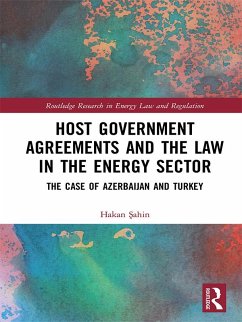Hakan Sahin
Host Government Agreements and the Law in the Energy Sector (eBook, ePUB)
The case of Azerbaijan and Turkey
42,95 €
42,95 €
inkl. MwSt.
Sofort per Download lieferbar

21 °P sammeln
42,95 €
Als Download kaufen

42,95 €
inkl. MwSt.
Sofort per Download lieferbar

21 °P sammeln
Jetzt verschenken
Alle Infos zum eBook verschenken
42,95 €
inkl. MwSt.
Sofort per Download lieferbar
Alle Infos zum eBook verschenken

21 °P sammeln
Hakan Sahin
Host Government Agreements and the Law in the Energy Sector (eBook, ePUB)
The case of Azerbaijan and Turkey
- Format: ePub
- Merkliste
- Auf die Merkliste
- Bewerten Bewerten
- Teilen
- Produkt teilen
- Produkterinnerung
- Produkterinnerung

Bitte loggen Sie sich zunächst in Ihr Kundenkonto ein oder registrieren Sie sich bei
bücher.de, um das eBook-Abo tolino select nutzen zu können.
Hier können Sie sich einloggen
Hier können Sie sich einloggen
Sie sind bereits eingeloggt. Klicken Sie auf 2. tolino select Abo, um fortzufahren.

Bitte loggen Sie sich zunächst in Ihr Kundenkonto ein oder registrieren Sie sich bei bücher.de, um das eBook-Abo tolino select nutzen zu können.
This book which determines the political risks that arise from unilateral actions of host governments during the life span of the energy investment projects. Focusing on stabilisation clauses as a political risk manager, it examines what influences host states to agree stability in their long term host governmental agreements.
- Geräte: eReader
- mit Kopierschutz
- eBook Hilfe
- Größe: 0.69MB
Andere Kunden interessierten sich auch für
![Host Government Agreements and the Law in the Energy Sector (eBook, PDF) Host Government Agreements and the Law in the Energy Sector (eBook, PDF)]() Hakan SahinHost Government Agreements and the Law in the Energy Sector (eBook, PDF)42,95 €
Hakan SahinHost Government Agreements and the Law in the Energy Sector (eBook, PDF)42,95 €![The Nature of the Firm in the Oil Industry (eBook, ePUB) The Nature of the Firm in the Oil Industry (eBook, ePUB)]() Basak BeyazayThe Nature of the Firm in the Oil Industry (eBook, ePUB)48,95 €
Basak BeyazayThe Nature of the Firm in the Oil Industry (eBook, ePUB)48,95 €![Nuclear Waste Politics (eBook, ePUB) Nuclear Waste Politics (eBook, ePUB)]() Matthew CottonNuclear Waste Politics (eBook, ePUB)47,95 €
Matthew CottonNuclear Waste Politics (eBook, ePUB)47,95 €![The World After Cheap Oil (eBook, ePUB) The World After Cheap Oil (eBook, ePUB)]() Rauli PartanenThe World After Cheap Oil (eBook, ePUB)65,95 €
Rauli PartanenThe World After Cheap Oil (eBook, ePUB)65,95 €![Ownership and Control of Oil (eBook, ePUB) Ownership and Control of Oil (eBook, ePUB)]() Bianca SarbuOwnership and Control of Oil (eBook, ePUB)44,95 €
Bianca SarbuOwnership and Control of Oil (eBook, ePUB)44,95 €![Thermal Engineering of Nuclear Power Stations (eBook, ePUB) Thermal Engineering of Nuclear Power Stations (eBook, ePUB)]() Charles F. BowmanThermal Engineering of Nuclear Power Stations (eBook, ePUB)57,95 €
Charles F. BowmanThermal Engineering of Nuclear Power Stations (eBook, ePUB)57,95 €![Energy Security and Cooperation in Eurasia (eBook, ePUB) Energy Security and Cooperation in Eurasia (eBook, ePUB)]() Ekaterina SvyatetsEnergy Security and Cooperation in Eurasia (eBook, ePUB)34,95 €
Ekaterina SvyatetsEnergy Security and Cooperation in Eurasia (eBook, ePUB)34,95 €-
-
-
This book which determines the political risks that arise from unilateral actions of host governments during the life span of the energy investment projects. Focusing on stabilisation clauses as a political risk manager, it examines what influences host states to agree stability in their long term host governmental agreements.
Dieser Download kann aus rechtlichen Gründen nur mit Rechnungsadresse in A, B, BG, CY, CZ, D, DK, EW, E, FIN, F, GR, HR, H, IRL, I, LT, L, LR, M, NL, PL, P, R, S, SLO, SK ausgeliefert werden.
Produktdetails
- Produktdetails
- Verlag: Taylor & Francis eBooks
- Seitenzahl: 208
- Erscheinungstermin: 12. Dezember 2018
- Englisch
- ISBN-13: 9780429584794
- Artikelnr.: 54784056
- Verlag: Taylor & Francis eBooks
- Seitenzahl: 208
- Erscheinungstermin: 12. Dezember 2018
- Englisch
- ISBN-13: 9780429584794
- Artikelnr.: 54784056
- Herstellerkennzeichnung Die Herstellerinformationen sind derzeit nicht verfügbar.
Hakan Sahin is an Assistant Professor in Private International Law at Maltepe University, Istanbul. He regularly advises state entities as well as private clients on a range of issues, including international energy law, international arbitration and international investment law.
Acknowledgements
List of abbreviations
PART I
Political risks in the energy sector
1 Introduction and framework of the research
Introduction
Expropriation or nationalisation?
Why are stabilisation clauses a controversial issue?
Host government agreements
Objectives and scope of the research
The gap in conventional literature
Research questions
Methodology
Overview of Azerbaijan and Turkey
Baku-Tbilisi-Ceyhan crude oil pipeline project: timeline, importance and
issues
Structure of the book
2 Indirect expropriation
Introduction
Distinguishing between direct and indirect expropriation
The types of host state measures that may constitute indirect expropriation
Criteria for the distinction between legitimate regulation (noncompensable
regulation) and indirect expropriation
Sole effect versus police power
Bilateral investment treaties of Azerbaijan and Turkey and their treaty
provisions concerning indirect expropriation
Tools for mitigating indirect expropriation risk
Conclusions
PART II
Mitigating political risks through stability provisions
3 Stabilisation clauses
Introduction
General implications of stabilisation clauses
Typologies of stabilisation clauses
Legal importance and functional value of stabilisation clauses
Do stabilisation provisions constitute a threat to environmental protection
and human rights?
The BTC pipeline project (I): reactions to the project
Conclusion
4 Lenders, risk insurers and rating agencies
Introduction
The main financial institutions in project financing
The role of lenders in inclusion of stabilisation clauses
Political risk insurance providers
The role of political risk insurance providers in the inclusion of
stabilisation clauses
Credit rating agencies
The role of credit rating providers in the inclusion of stabilisation
clauses
Baku-Tbilisi-Ceyhan pipeline project (II)
Conclusions
5 Political systems and laws on foreign investment in Azerbaijan and Turkey
Introduction
Azerbaijan
Turkey
A comparison of guarantees available under FDI laws and political regimes
in Azerbaijan and Turkey
Conclusions
PART III
Conclusion and recommendations
6 Conclusions and recommendations
The research findings and conclusions
Recommendations
Index
List of abbreviations
PART I
Political risks in the energy sector
1 Introduction and framework of the research
Introduction
Expropriation or nationalisation?
Why are stabilisation clauses a controversial issue?
Host government agreements
Objectives and scope of the research
The gap in conventional literature
Research questions
Methodology
Overview of Azerbaijan and Turkey
Baku-Tbilisi-Ceyhan crude oil pipeline project: timeline, importance and
issues
Structure of the book
2 Indirect expropriation
Introduction
Distinguishing between direct and indirect expropriation
The types of host state measures that may constitute indirect expropriation
Criteria for the distinction between legitimate regulation (noncompensable
regulation) and indirect expropriation
Sole effect versus police power
Bilateral investment treaties of Azerbaijan and Turkey and their treaty
provisions concerning indirect expropriation
Tools for mitigating indirect expropriation risk
Conclusions
PART II
Mitigating political risks through stability provisions
3 Stabilisation clauses
Introduction
General implications of stabilisation clauses
Typologies of stabilisation clauses
Legal importance and functional value of stabilisation clauses
Do stabilisation provisions constitute a threat to environmental protection
and human rights?
The BTC pipeline project (I): reactions to the project
Conclusion
4 Lenders, risk insurers and rating agencies
Introduction
The main financial institutions in project financing
The role of lenders in inclusion of stabilisation clauses
Political risk insurance providers
The role of political risk insurance providers in the inclusion of
stabilisation clauses
Credit rating agencies
The role of credit rating providers in the inclusion of stabilisation
clauses
Baku-Tbilisi-Ceyhan pipeline project (II)
Conclusions
5 Political systems and laws on foreign investment in Azerbaijan and Turkey
Introduction
Azerbaijan
Turkey
A comparison of guarantees available under FDI laws and political regimes
in Azerbaijan and Turkey
Conclusions
PART III
Conclusion and recommendations
6 Conclusions and recommendations
The research findings and conclusions
Recommendations
Index
Acknowledgements
List of abbreviations
PART I
Political risks in the energy sector
1 Introduction and framework of the research
Introduction
Expropriation or nationalisation?
Why are stabilisation clauses a controversial issue?
Host government agreements
Objectives and scope of the research
The gap in conventional literature
Research questions
Methodology
Overview of Azerbaijan and Turkey
Baku-Tbilisi-Ceyhan crude oil pipeline project: timeline, importance and
issues
Structure of the book
2 Indirect expropriation
Introduction
Distinguishing between direct and indirect expropriation
The types of host state measures that may constitute indirect expropriation
Criteria for the distinction between legitimate regulation (noncompensable
regulation) and indirect expropriation
Sole effect versus police power
Bilateral investment treaties of Azerbaijan and Turkey and their treaty
provisions concerning indirect expropriation
Tools for mitigating indirect expropriation risk
Conclusions
PART II
Mitigating political risks through stability provisions
3 Stabilisation clauses
Introduction
General implications of stabilisation clauses
Typologies of stabilisation clauses
Legal importance and functional value of stabilisation clauses
Do stabilisation provisions constitute a threat to environmental protection
and human rights?
The BTC pipeline project (I): reactions to the project
Conclusion
4 Lenders, risk insurers and rating agencies
Introduction
The main financial institutions in project financing
The role of lenders in inclusion of stabilisation clauses
Political risk insurance providers
The role of political risk insurance providers in the inclusion of
stabilisation clauses
Credit rating agencies
The role of credit rating providers in the inclusion of stabilisation
clauses
Baku-Tbilisi-Ceyhan pipeline project (II)
Conclusions
5 Political systems and laws on foreign investment in Azerbaijan and Turkey
Introduction
Azerbaijan
Turkey
A comparison of guarantees available under FDI laws and political regimes
in Azerbaijan and Turkey
Conclusions
PART III
Conclusion and recommendations
6 Conclusions and recommendations
The research findings and conclusions
Recommendations
Index
List of abbreviations
PART I
Political risks in the energy sector
1 Introduction and framework of the research
Introduction
Expropriation or nationalisation?
Why are stabilisation clauses a controversial issue?
Host government agreements
Objectives and scope of the research
The gap in conventional literature
Research questions
Methodology
Overview of Azerbaijan and Turkey
Baku-Tbilisi-Ceyhan crude oil pipeline project: timeline, importance and
issues
Structure of the book
2 Indirect expropriation
Introduction
Distinguishing between direct and indirect expropriation
The types of host state measures that may constitute indirect expropriation
Criteria for the distinction between legitimate regulation (noncompensable
regulation) and indirect expropriation
Sole effect versus police power
Bilateral investment treaties of Azerbaijan and Turkey and their treaty
provisions concerning indirect expropriation
Tools for mitigating indirect expropriation risk
Conclusions
PART II
Mitigating political risks through stability provisions
3 Stabilisation clauses
Introduction
General implications of stabilisation clauses
Typologies of stabilisation clauses
Legal importance and functional value of stabilisation clauses
Do stabilisation provisions constitute a threat to environmental protection
and human rights?
The BTC pipeline project (I): reactions to the project
Conclusion
4 Lenders, risk insurers and rating agencies
Introduction
The main financial institutions in project financing
The role of lenders in inclusion of stabilisation clauses
Political risk insurance providers
The role of political risk insurance providers in the inclusion of
stabilisation clauses
Credit rating agencies
The role of credit rating providers in the inclusion of stabilisation
clauses
Baku-Tbilisi-Ceyhan pipeline project (II)
Conclusions
5 Political systems and laws on foreign investment in Azerbaijan and Turkey
Introduction
Azerbaijan
Turkey
A comparison of guarantees available under FDI laws and political regimes
in Azerbaijan and Turkey
Conclusions
PART III
Conclusion and recommendations
6 Conclusions and recommendations
The research findings and conclusions
Recommendations
Index







